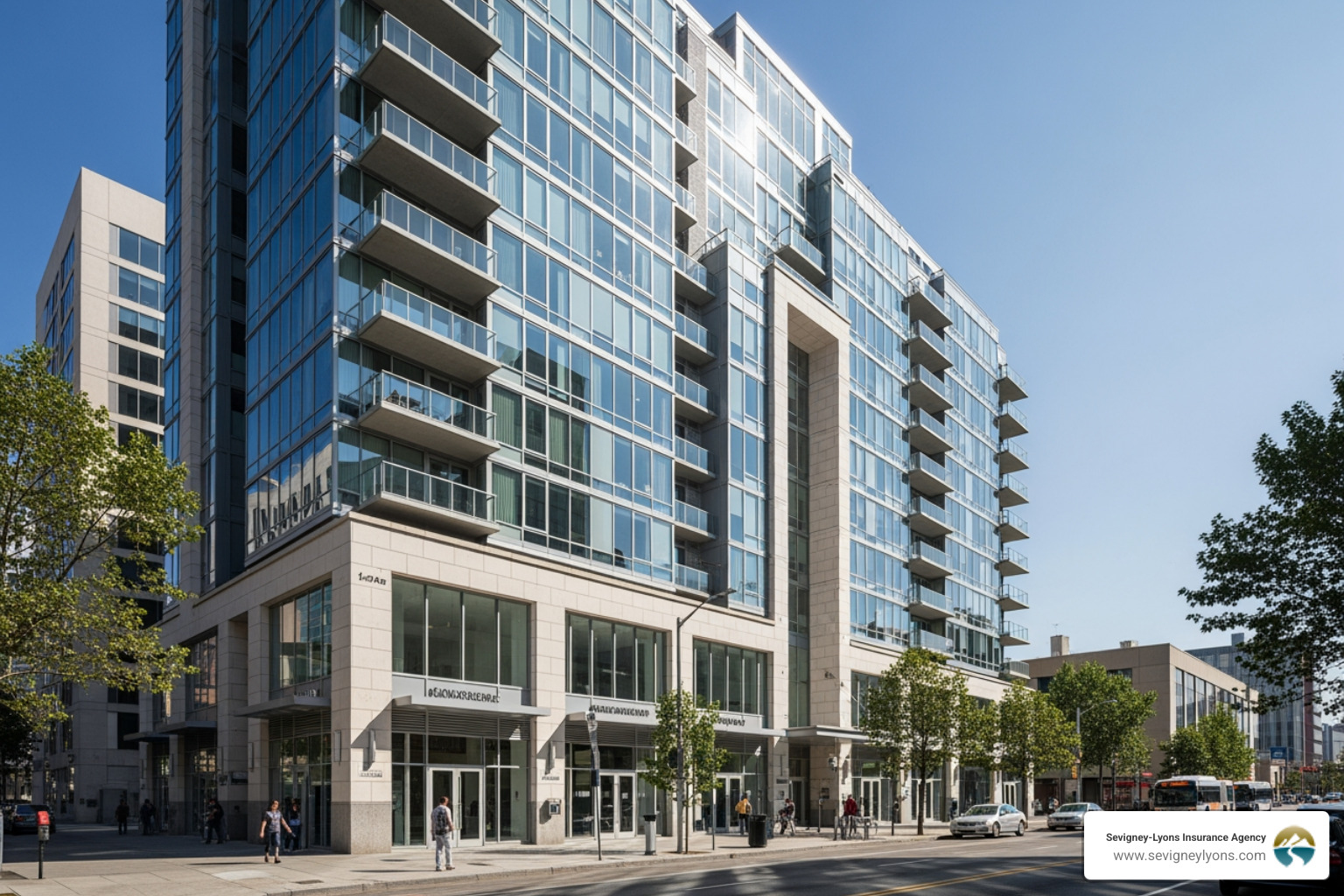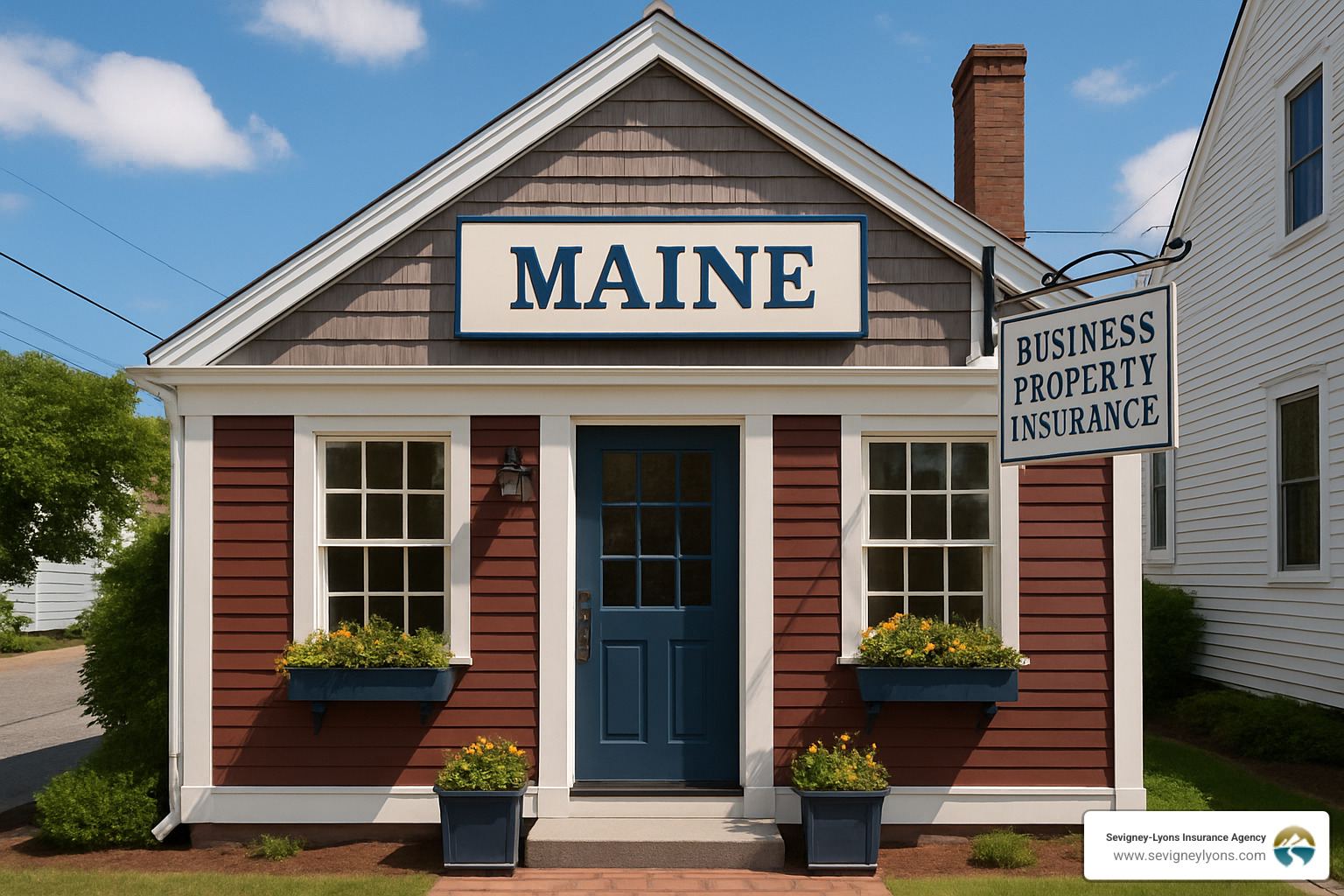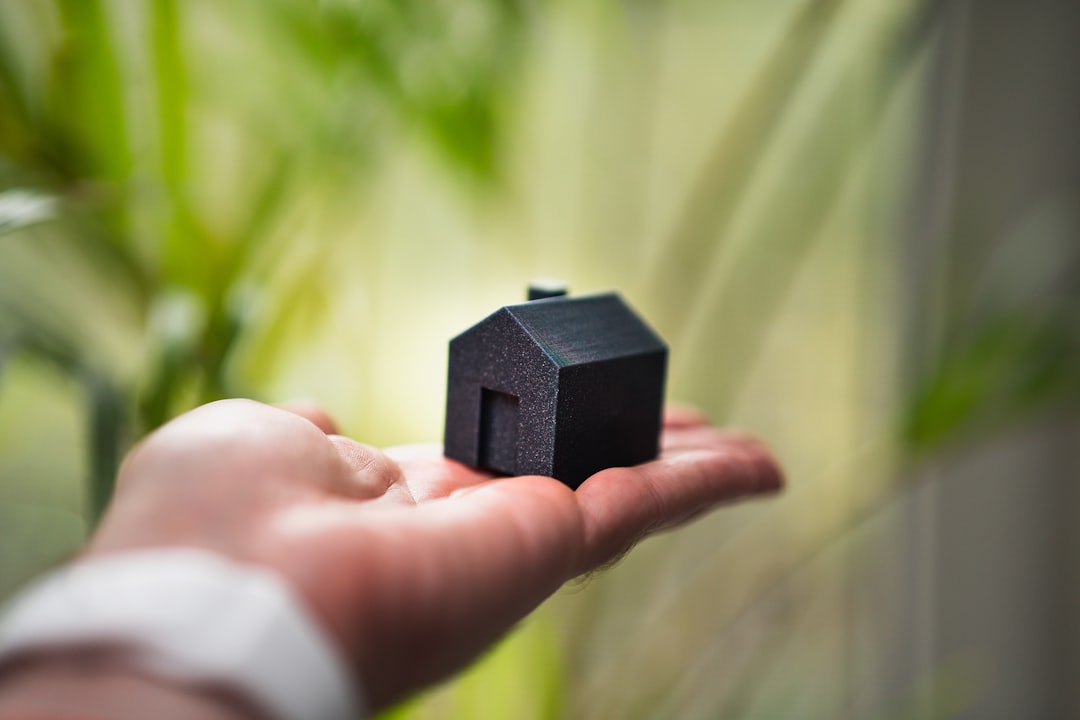Blog Content
Why Commercial Property Insurance is Essential for Maine Business Owners
Commercial property insurance protects your business's physical assets from unexpected events like fires, storms, theft, and vandalism. For Maine business owners, this coverage is often the difference between recovering quickly from a disaster and facing financial ruin.
What Commercial Property Insurance Covers:
- Buildings - Your business structure, permanently installed fixtures, and improvements
- Business Personal Property - Equipment, inventory, furniture, and supplies
- Business Interruption - Lost income when you can't operate due to covered damage
- Property of Others - Customer or client property in your care
Whether you own a restaurant in Wells, run a retail shop in Kennebunk, operate a construction business in Biddeford, or provide professional services in Ogunquit, your business depends on physical assets to generate income. A single storm, fire, or break-in could destroy years of hard work without proper protection.
Consider this scenario: A burst pipe ruins your inventory in a stockroom, or a tree falls on your shop's roof during a nor'easter. According to industry data, commercial property insurance can cost as little as $14 a month for some low-risk businesses, with the average business paying around $1,605 annually - a small price compared to the potential cost of replacing everything you've built.
The reality is simple: Maine's coastal location brings unique risks from severe weather, while our tourism-driven economy means many businesses face seasonal challenges that make financial resilience even more critical.
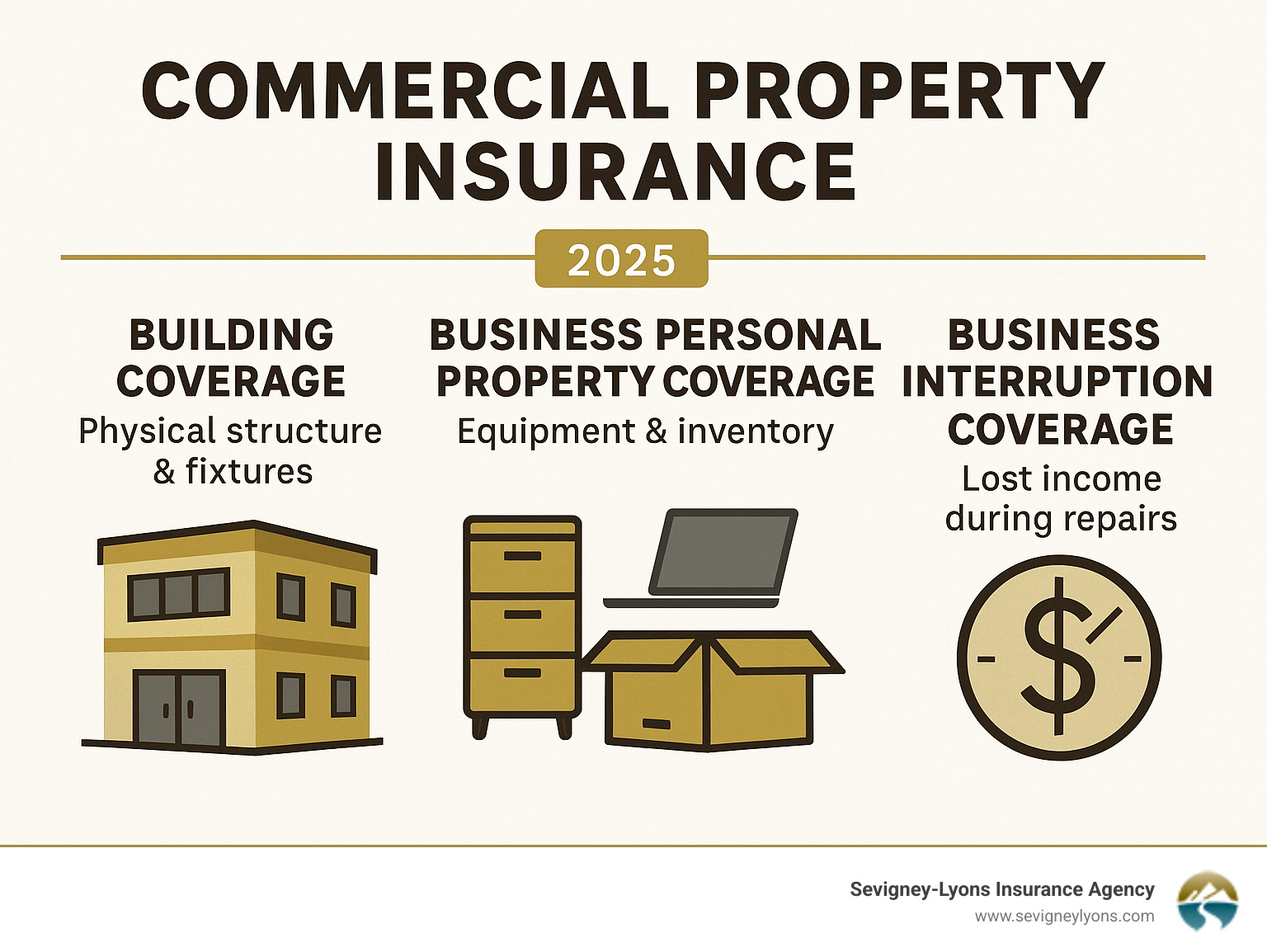
What is Commercial Property Insurance and Who Needs It?
Think of commercial property insurance as your business's safety net for everything you can see and touch. It's the coverage that steps in when the unexpected happens – whether that's a kitchen fire in your Wells restaurant, a break-in at your Kennebunk boutique, or storm damage to your Biddeford office building.
Commercial property insurance protects the physical foundation of your business operations. When a nor'easter knocks a tree through your roof or a burst pipe floods your inventory room, this coverage helps you get back on your feet without draining your savings account.
The beauty of this insurance lies in its comprehensive nature. It doesn't just cover your building – it protects your business personal property (all those computers, desks, and specialized equipment), and even covers property of others that might be in your care, custody, or control. Picture a customer's laptop being repaired at your tech shop when a fire breaks out – that's covered too.
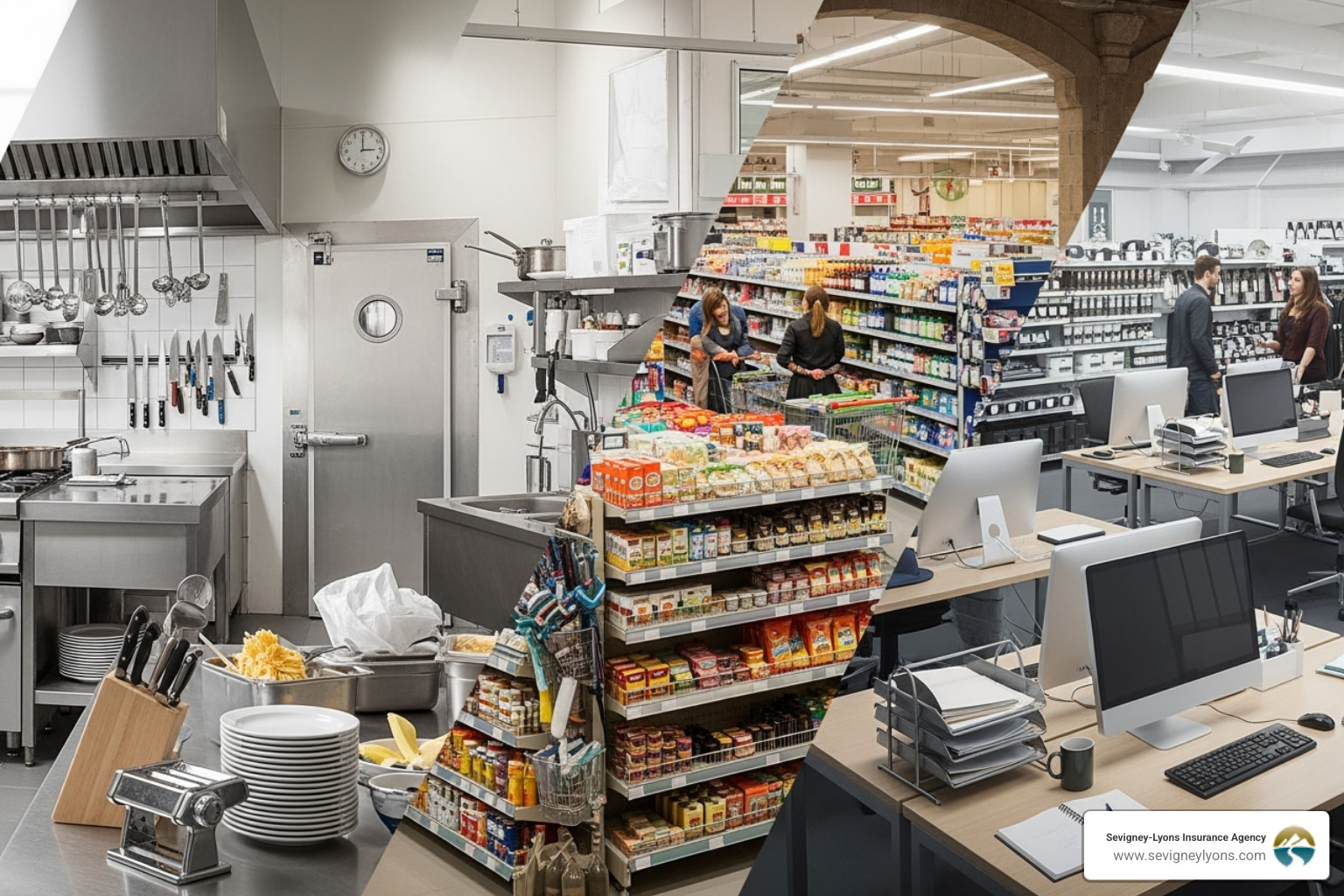
To understand how commercial property insurance fits into your broader protection strategy, check out our comprehensive guide on Business Insurance Coverage Maine.
What Does Commercial Property Insurance Cover?
Your policy covers the physical assets that make your business run. Understanding these details can prevent surprises later.
- The building or structure: This includes the walls, roof, and foundation you own, covering rebuilding costs after damage from storms or fires.
- Permanently installed fixtures: This covers built-in shelving, HVAC systems, lighting, and plumbing.
- Outdoor signs and fences: Your storefront sign and property fencing are also protected.
- Furniture and equipment: This includes office chairs, filing cabinets, and specialized machinery like commercial ovens or diagnostic tools.
- Inventory and stock: Crucial for retailers and restaurants, this covers products on your shelves and ingredients in your cooler.
- Computers and electronics: Your desktops, laptops, servers, and point-of-sale systems are covered.
- Leased equipment: Coverage can be added for your responsibility under a lease agreement for items like printing presses or construction equipment.
Which Maine Businesses Need This Coverage?
If your business uses physical property to generate income, you need commercial property insurance. In Maine's diverse economy, this applies to nearly everyone, from coastal tourism businesses to inland manufacturing operations.
- Retail stores in Biddeford need to protect their inventory, fixtures, and POS systems from events like fire that could wipe out their investment.
- Restaurants in Wells rely on expensive kitchen equipment, furniture, and food inventory. Coverage is a lifeline when a fire or equipment failure occurs.
- Contractors across Southern Maine must protect tools, equipment, and stored materials at their home base from theft or fire.
- Office-based professionals in Kennebunk or Ogunquit still need coverage. A burst pipe could destroy computers, files, and furniture, halting operations.
- Landlords and property managers own the buildings that house other businesses. A single incident could devastate their investment without proper coverage.
The industries that benefit most include hospitality businesses like hotels and bed-and-breakfasts, retail and e-commerce operations with physical locations, construction companies with expensive equipment, food and beverage establishments, manufacturing operations, healthcare practices with specialized equipment, and automotive businesses like repair shops and dealerships.
Really, if you can walk through your business and point to things that cost money to buy and would cost money to replace, you need commercial property insurance. It's that simple.
Deconstructing Your Policy: Perils, Levels, and Exclusions
Think of your commercial property insurance policy as a detailed contract that spells out exactly what's covered, what's not, and under what circumstances. The key to understanding your protection lies in grasping three main concepts: the "perils" (causes of damage) your policy covers, the level of coverage you've chosen, and what's specifically excluded.
Most policies fall into two camps: named perils policies that list specific causes of damage they'll cover, and open perils policies that cover everything except what's specifically excluded. It's like the difference between a restaurant menu that lists every dish available versus one that says "we serve everything except what's on this short 'we don't make this' list."
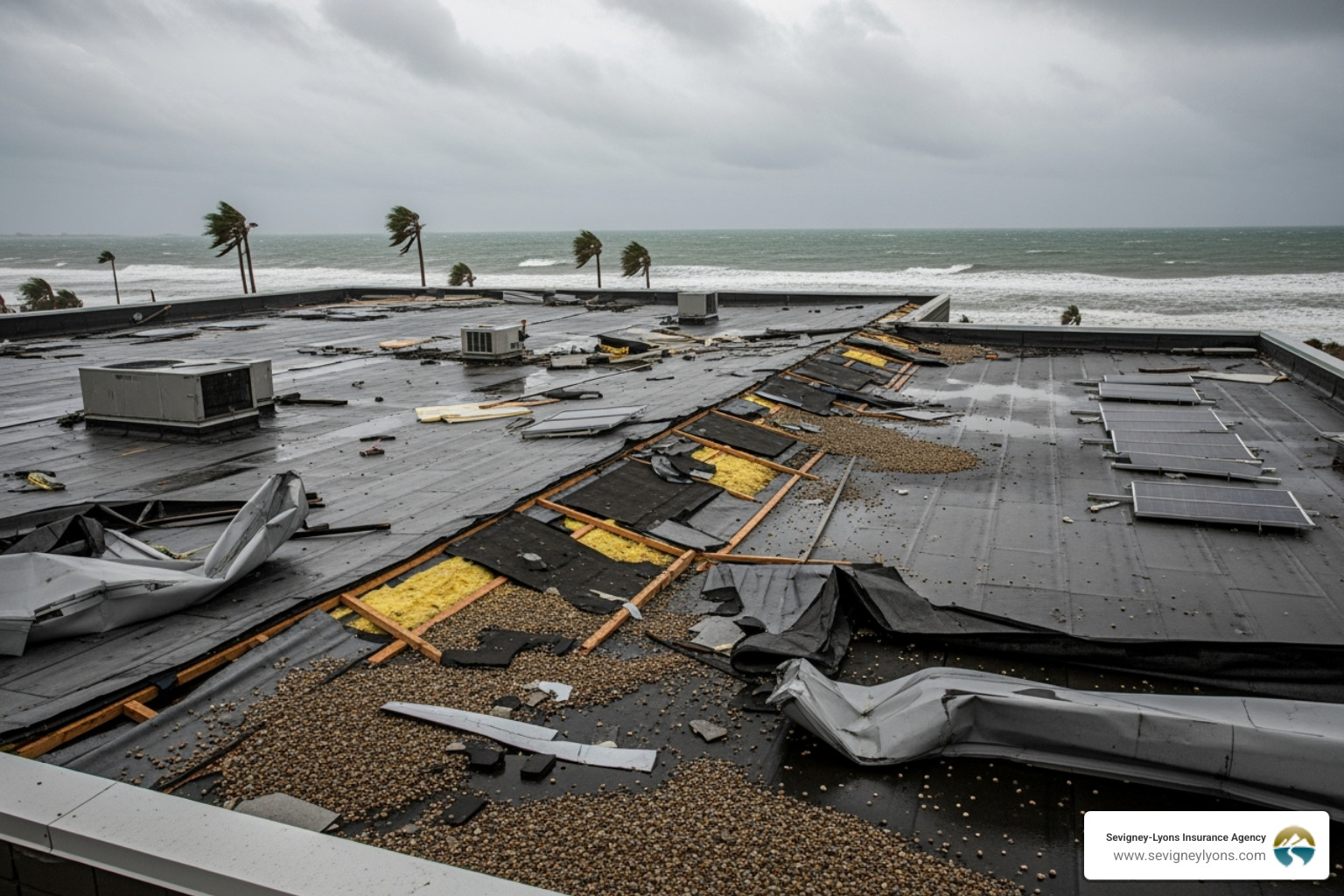
Common Covered Perils
When you're running a business in Maine, certain disasters keep you up at night. The good news? Commercial property insurance typically covers the most common threats to your livelihood.
- Fire and smoke damage is a top risk, destroying property and ruining inventory.
- Theft and vandalism coverage protects you from break-ins or malicious damage.
- Windstorms and hail are common in Maine, especially nor'easters. Policies typically cover this crucial wind damage.
- Lightning strikes can fry electronic systems in an instant, and this damage is usually covered.
- Vehicles or aircraft can cause unexpected damage, like a car sliding into your storefront in winter.
- Sprinkler leakage covers damage from a malfunctioning fire suppression system.
- Sinkhole collapse, while less common in Maine, is typically included.
Understanding Coverage Levels: Basic, Broad, and Special Forms
Commercial property insurance comes in three main flavors, each offering different levels of protection. Think of them as good, better, and best options for your business.
- Basic Form is the most limited, covering only a specific list of named perils like fire, windstorm, and vandalism. If the cause of loss isn't on the list, it's not covered.
- Broad Form includes all Basic Form perils plus others like falling objects, weight of snow and ice, and water damage from appliance leakage.
- Special Form offers the most protection. It covers everything unless it's specifically excluded, shifting the burden of proof from you to the insurer. This is often called "all-risk" coverage and is recommended for most Maine businesses.
Common Policy Exclusions and Gaps
Even the most comprehensive commercial property insurance policy has its limits. Understanding what's not covered helps you avoid nasty surprises when you need your insurance most.
- Flood damage from storm surge or overflowing rivers is not covered. Given Maine's coast and rivers, this is a critical gap. You need a separate flood insurance policy, which often has a 30-day waiting period, to be protected.
- Earthquake and earth movement damage requires separate coverage.
- Wear and tear from normal use or deferred maintenance is not covered.
- Intentional damage by you or your employees isn't covered.
- Government action, like when authorities condemn or seize property, is typically excluded.
- Liability claims for customer injuries or damage to others' property require General Liability Insurance Maine.
Essential Endorsements for Maine Businesses
Endorsements let you customize your commercial property insurance to match your specific business needs, plugging gaps in basic coverage.
- Business Interruption Insurance is a vital endorsement. When a covered loss forces you to close, it replaces lost income and covers ongoing expenses like rent and payroll, keeping you financially stable during rebuilding.
- Equipment Breakdown Coverage handles mechanical failures that standard policies miss, like a walk-in cooler dying or equipment failing from a power surge. It covers repair or replacement costs.
- Inland Marine coverage is essential for contractors. It protects tools and equipment while in transit, at a job site, or stored off-site. Learn more in our guide to Artisan Contractors Insurance Coverage.
- Ordinance or Law Coverage covers the extra cost to comply with current building codes when rebuilding after a loss. These upgrades can be substantial, especially in historic areas like downtown Biddeford.
The Financial Side of Commercial Property Insurance: Cost, Value, and Savings
Understanding the financial aspects of commercial property insurance doesn't have to feel overwhelming. Think of it like any other business investment - you want to know what you're paying, what you're getting, and how to make smart choices that protect your bottom line.
When you sit down with us to discuss your coverage, we'll walk through three key financial components: your premium (what you pay annually), your deductible (your out-of-pocket cost when filing a claim), and your coverage limits (the maximum amount your policy will pay out). Getting these right means you're protected without breaking the bank.

Replacement Cost (RC) vs. Actual Cash Value (ACV)
This is one of the most important decisions you'll make about your commercial property insurance. The choice between Replacement Cost and Actual Cash Value can mean the difference between fully recovering and struggling to rebuild.
Replacement Cost (RC) pays to repair or replace your damaged property with new items at current prices, without deducting for depreciation. If a fire destroys your ten-year-old oven in Wells, RC pays for a brand-new one.
Actual Cash Value (ACV) pays the replacement cost minus depreciation for age and wear. For that same ten-year-old oven, you might only get 40% of its replacement cost, leaving you to pay the rest.
For example, a five-year-old POS system in your Kennebunk shop gets fried by a power surge. With Replacement Cost coverage, you'd receive enough to buy a new, comparable system. With Actual Cash Value, you might only receive $1,500 after depreciation, leaving you to find the extra cash for a full replacement.
We almost always recommend Replacement Cost coverage. While it costs more upfront, it ensures you can get back on your feet after a loss without dipping into savings or taking on debt.
Factors Influencing Your Commercial Property Insurance Premium
Your commercial property insurance premium is calculated based on your business's specific risks. Understanding these factors helps you see why your Ogunquit beachfront shop might pay different rates than a similar business in inland Biddeford.
- Location: A coastal business faces different risks than one inland. Proximity to fire stations and local crime rates also affect your premium.
- Building construction and age: Newer buildings with fire-resistant materials and modern wiring are less risky than older wooden structures, resulting in lower premiums.
- Occupancy: This refers to your business type. A restaurant with cooking equipment has different risks than an accounting office, which is reflected in the premium.
- Safety measures: Sprinklers, fire alarms, and security systems can lower your premium by demonstrating proactive risk prevention.
- Claims history: A history of frequent claims signals higher risk and can increase premiums, while a claim-free record can lead to discounts.
How to Reduce Your Insurance Costs
There are several proven ways to reduce your commercial property insurance costs without sacrificing the protection your Maine business needs.
- Practice smart risk management: Regular maintenance on your roof and heating system prevents small issues from becoming large claims and can lead to better rates.
- Install safety and security systems: The premium discounts for sprinklers, fire alarms, and security systems often make them a worthwhile investment.
- Choose a higher deductible: Opting for a $2,500 or $5,000 deductible instead of $1,000 can lower your premium, but ensure you have the cash to cover it if needed.
- Bundle your coverage: A Business Owner's Policy (BOP) combines property and general liability insurance, often at a lower cost than buying them separately.
- Conduct annual policy reviews: A quick annual check-in with us can identify opportunities to optimize both your coverage and your costs as your business evolves.
For more comprehensive insights on protecting your Maine business cost-effectively, check out our guide on Maine Business Insurance Essential 2025.
The cheapest policy isn't always the best value. Our goal is helping you find the right balance of comprehensive protection and reasonable cost, so you can focus on running your business with confidence.
Frequently Asked Questions about Commercial Property Insurance
Business owners in Maine often have similar questions when exploring commercial property insurance. Let's walk through the most common concerns we hear from entrepreneurs across Southern Maine, from Portland to Ogunquit.
Is commercial property insurance legally required in Maine?
No, Maine state law does not require businesses to carry commercial property insurance. However, it's often required by others.
- Your mortgage lender will require it to protect their investment if you've financed your commercial property.
- Your landlord will require it in your lease agreement to protect their building and ensure you can cover your own assets.
It's a smart business practice. The risk of paying for a total loss out-of-pocket could bankrupt your business. It's about protecting what you've built.
What if I rent my business space? Do I still need coverage?
Yes. It's a common misconception that a landlord's insurance covers the tenant's business, but this is incorrect.
Your landlord's policy only covers the building structure. It does not cover your business's property, such as your computers, inventory, furniture, or equipment in your Wells or Kennebunk space. You are responsible for replacing these items after a fire or theft.
You are also responsible for improvements you've made, like custom lighting or flooring. Your own policy is needed to protect these "tenant improvements and betterments."
Most commercial leases require tenants to carry their own property coverage to ensure all parties are protected. For a deeper dive, check out our guide on Commercial Renters Insurance Maine.
How do I file a claim after a loss?
When disaster strikes your Biddeford restaurant or Ogunquit retail shop, knowing the right steps can make for a smoother recovery.
- Prioritize safety first. Then, take steps to prevent further damage, like shutting off the water after a pipe bursts or boarding up broken windows.
- Document the loss immediately. Take extensive photos and videos of all damage before cleaning up. Create a detailed list of damaged or stolen items with their estimated values, and gather any receipts or invoices.
- Contact us, your insurance agent, as soon as possible. Prompt notification is required by your policy, and we will guide you through the next steps.
- Cooperate with the claims adjuster. This professional will inspect the damage and review your documentation to determine coverage. Provide all requested information and ask questions.
- Keep detailed records of all communications, paperwork, and repair estimates throughout the claims process.
We're here to advocate for you throughout the entire claims process. Our job is to help ensure you get the fair settlement you deserve so you can get back to serving your community as quickly as possible.
Conclusion
Think of commercial property insurance as your business's financial lifeline when disaster strikes. Whether it's a nor'easter tearing through Wells, a kitchen fire in your Kennebunk restaurant, or a break-in at your Biddeford retail shop, this coverage stands between you and potentially devastating financial losses.
Throughout this guide, we've walked through the essential components that make up solid protection: building coverage for your physical structure, business personal property coverage for your equipment and inventory, and business interruption coverage to keep money flowing when you can't operate. We've also explored the different coverage levels, from basic named perils to comprehensive special form policies that protect against nearly everything except specific exclusions.
The reality is that Maine businesses face unique challenges. Our coastal location brings beautiful scenery but also powerful storms. Our tourism-driven economy creates seasonal pressures that make financial resilience even more critical. A single unexpected event shouldn't be able to wipe out years of hard work and investment.
Smart risk management goes hand in hand with proper insurance coverage. Installing security systems, maintaining your property, and understanding your policy's details all work together to protect your business. The most expensive insurance policy is the one you don't have when you need it most.
At Sevigney-Lyons Insurance Agency, we've spent decades helping Maine business owners steer these waters. We know that every business in Ogunquit, Wells, Kennebunk, and Biddeford has its own unique story and specific needs. That's why we don't believe in one-size-fits-all solutions.
Our job is to listen to your concerns, understand your business operations, and craft protection that makes sense for your situation and budget. We're not just selling policies—we're building relationships with neighbors and helping our community thrive.
Don't wait for disaster to test whether you're properly protected. Get expert guidance on your commercial insurance needs and give yourself the peace of mind that comes with knowing your business can weather any storm.

